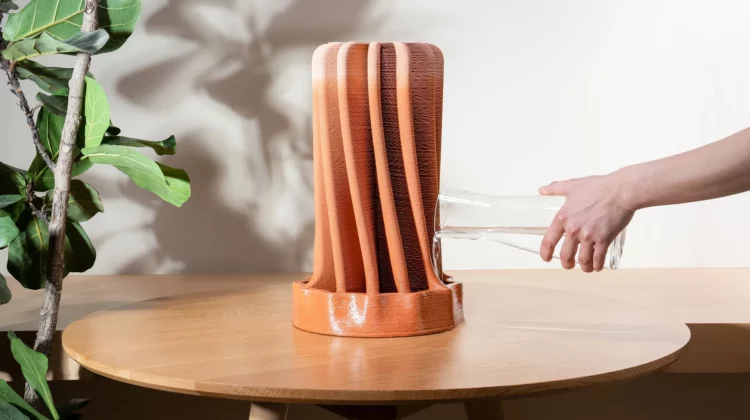
The four winners of the 2023 Lexus Design Awards, which call upon young creative talent around the world to ‘design for a better tomorrow’, recently presented their final designs at Milan Design Week.
The four winners were chosen from 2,068 entries originating from 63 countries and regions around the world. According to Lexus, the winners were selected ‘for their original and inventive solutions, which highlight the creative interplay between design and technology’.They were funded to build their prototypes with world-class mentors.
Chinese designer Jiaming Liu was awarded for his Print Clay Humidifier (pictured above), a 3D-printed non-electric humidifier made with recycled ceramic waste. After rounds of testing and prototyping with different materials and techniques, Jiaming landed on a 3D-printing method and powdered ceramic (recycled from ceramic waste) that further improved water-absorption efficiency.
Denmark-based designer Pavels Hedström was awarded for Fog-X, a jacket that transforms into a shelter that catches fog and turns it into drinking water. Through the mentorship programme, Fog-X evolved significantly – transforming from a heavy backpack to a light jacket/shelter and adding the creation of a mobile application for easy access to fog.
Temporary Office, the design team of Vincent Lai and Douglas Lee, graduates from the University of California, Berkeley, was awarded for Touch the Valley, a 3D topographic puzzle that helps the visually impaired learn about the physical environment through the sense of touch. Taking feedback from user testing, the playability of the puzzle improved by adding small features to the puzzle, including magnet feedback, elevational grooves and smoother edges – enabling users to joyfully immerse in the process of play and exploration without too much of a cognitive load.
Kyeongho Park and Yejin Heo, Republic of Korea students majoring in industrial design at Hanyang University’s ERICA campus, were awarded for Zero Bag, an eco-friendly package with paper detergent or baking soda film attached to an alginate water-soluble bag. Through the mentoring programme, Kyeongho and Yejin developed and articulated the potential use cases and target markets for this type of product. The idea for packaging for the clothing retail market evolved to include explorations for different industries, from clothes to food. The process of development is continuing to evolve, as the designers embrace the potential of their ideas.


